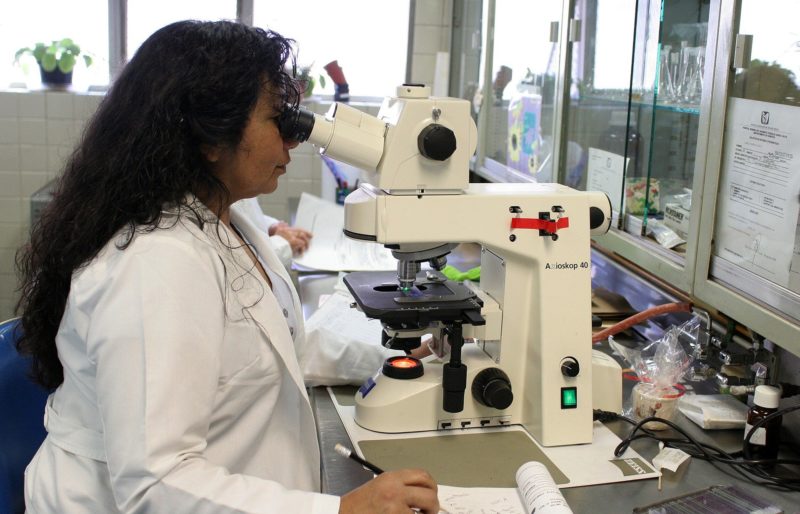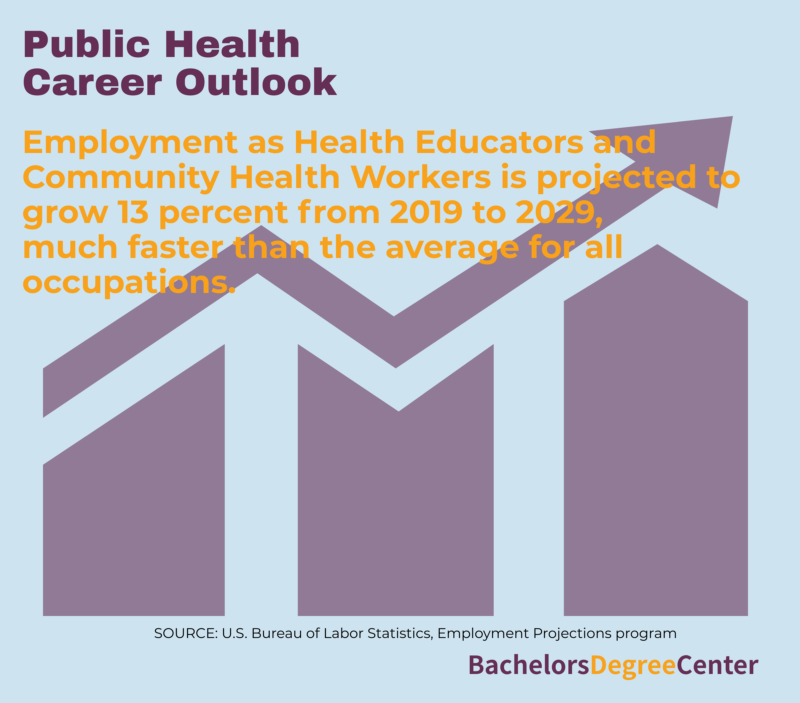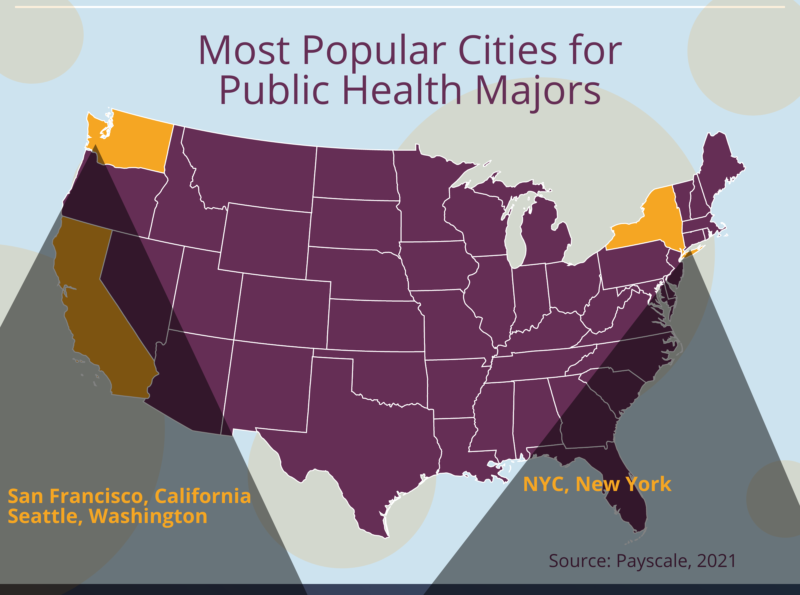Getting a bachelor’s in public health can be the first step toward one of the most rewarding career paths in the 21st century. Public health is the academic study that is dedicated to identifying and preventing disease outbreaks – like the COVID-19 pandemic, and to modifying exiting systemic health dilemmas that impact the population overall, like environmental pollution, among other objectives.
The Centers for Disease Control, situated in Atlanta, Georgia, (CDC), has defined the concept of public health as the science of protecting/improving community health through program promotions that include –
- Research that seeks to prevent injuries or eradicates/manages disease.
- Healthy Lifestyles and improve.
- The control and identification of infectious disease.
Is Public Health a Good Career?
For students with a significant interest in one of the many fascinating careers in public health, it is important to consider these relevant questions –
- Is public health a good career based on your income objectives?
- Is a bachelors in public health worth it?
- Which public health degree careers are the most popular?
- Are there careers in public health that allow professionals to work internationally?
- Which of the many public health careers would suit your talents and skills?
Civic-minded students often pursue careers in public health as the public health field offers a variety of healthcare occupations from the national to the community level.
With a public health degree, you may work for government agencies, health organizations, nonprofit organizations, and other parts of the health care system, or in a related field Career options and job titles include:
- occupational health
- health services manager
- policy analyst
- biostatistician
Public health professionals help with improving health outcomes, emergency preparedness, public health policy, wellness initiatives, educational outreach, and more. Whether you are an entry-level research assistant or a full-time professional with a master of public health, you will be making a difference.
Accreditation for Public Health Degree Programs
Deciding which school or program to choose from the many available best undergraduate public health programs is a life-impacting decision. But how do students decide which of these best undergraduate public health programs is the right choice for them and worth the tuition costs required to earn the degree?
The most direct technique in determining the quality of an academic degree is to identify if the school/university is regionally accredited or the program has been received specialized accreditation from a sanctioned agency. Accreditation is the process that determines if the school or university meets the education criteria as established by the relevant agency. The two primary types of accreditation — regional and specialized, are discussed below.
The process of accreditation offers prospective students a formalized but independent review of competence and offers a public recognition of the school or program’s quality and ongoing commitment to maintaining the educational quality.
Regional Accreditation
Regional accreditation is considered the oldest accrediting process that is overseen by the US Federal Government. The US higher education system is divided into six fundamental regional agencies. These CHEA-overseen agencies (Council for Higher Education Accreditation) review and ultimately issue accreditation to the school, not a specific program or division/college within the larger school.
Regional accreditation provides potential students a level of certainty as they consider post-secondary options and is an important consideration for students who may want to transfer credits to another school or apply to a master’s level program after graduation.
Specialized Accreditation
Specific degree programs, like an undergraduate degree in public health, can be accredited at the specialized level. Specialized accreditation provides students with an essential assurance that the academic degree offered by the school meets a pre-defined set of standards, typically determined by an industry oversight board.
Public health program accreditation is primarily managed by the CEPH — the Council on Education for Public Health. Public health program accreditation is discussed below, including the answer to the question – How important is CEPH accreditation?
The Council on Education for Public Health
Public health education began in 1940 with the American Public health Association (APHA). The CEPH was an offshoot of the APHA but was eventually tasked with the responsibility of evaluating schools and public health education programs. CEPH accreditation criteria were further developed and refined in the late 1970s when CEPH asked educators and practitioners to help redefine CEPH accreditation criteria for public health education moving forward. Ultimately, the CEPH seeks to ensure the public health education achieves a level of excellence and quality with regards to the practice, service, and research in public health.
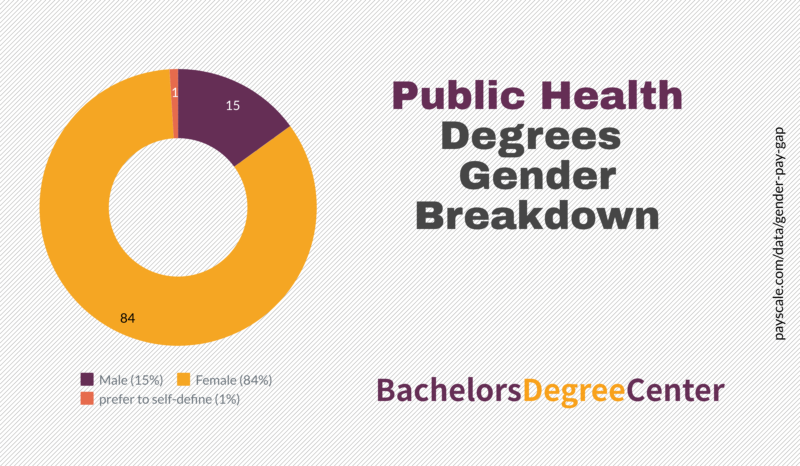
Types of Public Health Bachelor Degrees
Many public health bachelor degree programs open up the door to a wide variety of job opportunities; however, many students choose a public health degree or public health major as the first step towards a more advanced degree. Public health bachelor degree programs are available throughout the country. There are both quality online public health degrees as well as public health degree programs offered traditionally on-campus.
Most public health majors are enrolled in a university’s School of Public Health but are still required to complete general education requirements in mathematics, English, and humanities, among others, during the first two years of the student’s college tenure when studying to earn a BS in Public Health. Other coursework for one of the many online degree in public health programs may be mandated to gain entrance into the school’s public health track, which may require classes in biology, American history, reading and composition, and critical thinking, among others.
In the last two years of the degree program, a public health major enrolled in a public health degree program will begin to focus coursework from the public health bachelor curriculum. While some public health programs may offer an academic emphasis within your selected major, students will typically take classes in statistics, disease, epidemiology, & health policy, to name a few.
A public health bachelor curriculum for a typical BS in Public Health will include coursework, as follows –
- Public Health Theory.
- Public Health History & Practice.
- Social & Behavioral Impacts on Epidemiology/Health.
- Environmental Health.
- Health Policy.
- Nutrition.
- Healthcare Delivery Systems.
- Community Health Planning.
- Research methodology.
- Human Development.
- Epidemiology.
- Infectious Diseases.
- Grant Writing.
- Public health Data Analysis.
- Biostatistics.
- Social Sciences, which may include sociology, psychology, or economics, among others.
Many public health major students enrolled in a BS in Public Health program complete the public health degree online or on-campus with either a senior thesis/capstone project or an internship in a related job. If the public health degree is offered by a School of Public Health is one of the many quality, online public health degrees available in the marketplace, students can complete their practicum or internship in a related job in the area in which they reside. Students enrolled in a degree in public health online or on-campus are encouraged to gain the benefit of hands-on experience earned through a supervised internship.
Students interested in applying to a School of Public Health will find that there are these fundamental types of on-campus and online degree in public health programs. These campus-based on online public health degrees include –
- A Bachelor of Arts (BA) degree in Public Health, which focuses more on coursework related to social sciences.
- A Bachelor of Science (BS) degree in Public health, which focuses more on natural or hard sciences.
- A BAS — a Bachelor of Applied Science degree in Public health, which focuses mostly in coursework from a public health curriculum.
Most campus-based public health programs require four years to complete; however, online degree in public health programs often offer accelerated delivery options for interested students. These fast-track degree in public health online options offer both convenience and flexibility as they provide asynchronous learning options for students with time limitations. And these public health degree online options are often both accredited at the regional and specialized levels.
The majority of undergraduate students who earn a degree in public health online or on-campus choose to pursue a more advanced degree – the MPH earn an advanced degree. A more advanced public health degree online will allow public health professionals to be qualified for positions of leadership or research.
License & Certifications in Public Health
The decision to earn one of the many certifications for public health is an important career decision. Earning a public health certification requires a commitment as it includes a comprehensive exam, plus mandated continuing education requirements to maintain the public health certification.
The availability of public health certificates has recently become quite competitive. As you consider your public health career, consider these available certifications in public health.
The National Commission for Health Education Credentialing (NCHEC)
Headquartered in Pennsylvania and founded in the late 1980s, the National Commission for Health Education Credentialing (NCHEC) was developed to promote and improve the health of the population by maintaining strict standards to health education certification processes. The NCHEC — the National Commission for Health Education Credentialing provides professionals with two public health certificates options, as follows -
The Certified Health Education Specialist (CHES®)
The CHES public health certification specialist was developed for public health professionals who have just entered into the early stages of their careers. This certificate in public health requires applicants to pass a comprehensive exam covering seven areas of public health specialist’s responsibilities. The seven areas of responsibility to earn this certificate of public health include –
- Needs Assessment & Health Education/Promotion Capacity.
- Health Education Planning & Promotion.
- The Implementation and Promotion of Health Education.
- Perform Research & Evaluations Related to the Promotion and Implementation of Health Education.
- Manage/Administer Health Education & Promotion.
- Provide Health Education Resources.
- The Professional Health Educator and Promoter.
The Master Certified Health Education Specialist (MCHES®)
The MCHES certificate in public health education was developed for public health professionals who have just entered into the early stages of their career. The MCHES certificate of public health option was developed for the advanced standing public health practitioner. Applicants for this certificate in public health education must have at least five years of professional experience in the field of public health. To earn one of these certifications for public health education specialists requires applicants to pass a competency exam and meet the continuing education requirements of this certificate of public health.
The National Board of Public Health Examiners (NBPHE)
Founded in 2005, the National Board of Public Health Examiners (NBPHE) operates independently, seeking to ensure public health professionals possess the skills required to deliver contemporary public health care. The NBPHE accomplishes its goals by offering one of the available certifications for public health professionals in the marketplace. The NBPHE’s certifications for public health include the CPH credential – the Certified in Public Health certificate. Applicants interested in earning one of the NBPHE’s certifications for public health must also meet continuing education requirements to maintain the certificate.
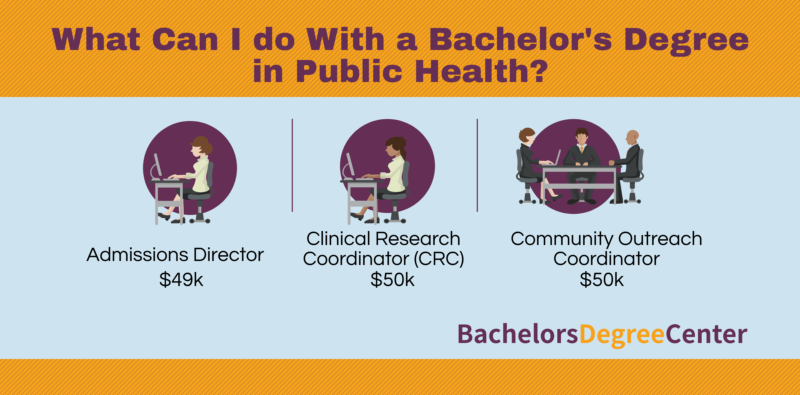
Careers in Public Health with a Bachelor’s Degree
Fortunately, there is a wide variety of Bachelors in Public Health jobs from which to choose. As you consider the various public health administrator jobs and public health worker jobs, ask yourself these relevant questions –
- Are there available public health bachelor degree jobs available that meet your career goals?
- Are there public health bachelors degree jobs that are available internationally?
- Are there Bachelor of Science in Public Health jobs that offer a compensation package that meet your requirements?
- Which BS in Public Health jobs pay the most?
The available Bachelor of Science in Public Health jobs are generally defined by the location of the job. Public Health Administrator jobs are available in four work settings –
- Academia, which often includes teaching or research.
- The Public Sector, which may include government work in health administration or nursing.
- The Nonprofit Sector, which includes work with population concerns or with a specific segment of the population.
- The Private Sector, which includes work in healthcare institutions, nursing homes, hospitals, or insurance companies, to name a few.
These are the main areas of public health –
- Policy and Health Management.
- Social and Behavioral Health.
- Biostatistics and Health Informatics.
- Minority Health.
- Epidemiology.
- Nutritional Health.
- Community Health.
- Environmental Health.
- Global Health.
- Health Communications and Public Relations.
- Pediatric Health.
Bachelors in Public Health Jobs
The following offers students a glimpse at the many available BS in Public health jobs -
A Healthcare Administrator manages health care agencies or facilities from a business perspective – to maintain and provide quality health care to the public.
A Health Educator is an essential part of the community in which they live and work. As a health educator, a public health professional is tasked with the responsibility of educating the public with regard to living and maintaining healthy lifestyle choices while amassing data that is used to make large health policy decisions.
A Public Health Nurse provides health services to members of the community who may not have access to health care services at all. Public health nurses find rewarding careers in occupational facilities, state health departments, and correctional facilities, to name a few.
A Social Worker advocates/facilitate for members of a community or health care facility – seeking to improve their client’s lives by offering options for change, education, and empowerment.
A Public Health Officer enforces relevant health laws and acts as a liaison between local communities and officials working at the state & federal level regarding environmental and public health issues.
Public Health Salary Potential
The following public health bachelor degree salary reveals that there were more than 125,000 health educators and community health workers employed in the United States during 2019. The median salary for health educators & community health workers for 2020 was $48,140 each year, which translates to $23.15 per hour, according to the BLS.
The following represents the public health salary percentiles for health education specialists -
| Percentile | Public Health Bachelor Degree Salary |
| 10% | $ 33,720 per year |
| 25% | $ 41,870 per year |
| Median – 50% | $ 56,500 per year |
| 75% | $ 77,300 per year |
| 90% | $ 101,890 per year |
The top paying states for health education specialists are as follows –
| State | Public Health Salary |
| Washington, DC | $ 97,390 per year |
| Georgia | $ 93,580 per year |
| Maryland | $ 82,080 per year |
| Rhode Island | $ 76,730 per year |
| California | $ 70,230 per year |
The states that have the highest level of employment for health education specialists are as follows –
| State | Number of Public Health Jobs | Public Health Salary |
| California | 6,600 | $ 70,230 per year |
| New York | 4,190 | $ 57,830 per year |
| Texas | 3,420 | $ 54,460 per year |
| Florida | 3,230 | $ 58,770 per year |
| Pennsylvania | 2,770 | $ 62,620 per year |
The following represents the public health salary percentiles for community health workers -
| Percentile | Public Health Bachelor Degree Salary |
| 10% | $ 28,010 per year |
| 25% | $ 33,960 per year |
| Median – 50% | $ 42,000 per year |
| 75% | $ 54,320 per year |
| 90% | $ 70,790 per year |
The top paying states for community health workers are as follows –
| State | Public Health Salary |
| Washington, DC | $ 62,040 per year |
| New Mexico | $ 60,230 per year |
| Alaska | $ 58,230 per year |
| Rhode Island | $ 57,820 per year |
| Connecticut | $ 56,380 per year |
The highest level of employment for community health workers are in these states, as follows –
| State | Number of Public Health Jobs | Public Health Salary |
| New York | 7,300 | $ 46,130 per year |
| California | 5,960 | $ 52,940 per year |
| Texas | 3,350 | $ 41,070 per year |
| Washington | 3,100 | $ 46,440 per year |
| Massachusetts | 2,770 | $ 46,300 per year |
Other Public Health Salary Jobs for Those With a Baccalaureate Degree
| Public Health Occupation Alternatives | Median Salary for 2020 |
| Nutritionists & Dietitians | $ 63,090 per year |
| Social & Human Svc. Assistants | $ 35,960 per year |
| Social Workers | $ 51,760 per year |
| Substance Abuse/Mental Health Counselors | $ 47,660 per year |
Professional Organizations for Public Health Students & Professionals
Professional organizations are developed by industry experts and advocates to perform as a support and voice for the industry’s member companies and professionals. Public health professionals have a variety of professional organizations from which to choose. Each of these professional organizations is dedicated to supporting the professionals in the particular slice of the public health industry.
Professional organizations offer their members many benefits, which include –
- Job Boards.
- Awards & Recognition.
- National and Regional Conferences/Seminars for members.
- Continuing Education opportunities.
- Networking Opportunities.
- Publications & Other Resources.
- Advocacy & support, among others.
Public health professionals can join one of these professional organizations –
The American Public Health Association (APHA)
Founded in early-1870s, the American Public Health Association (APHA) holds the distinction of being both the oldest and the most diverse professional organization developed to support public health professionals across the globe.
The American Epidemiology Society (APES)
The American Epidemiological Society seeks to provide a scientific forum where senior epidemiologists can share information with other members. Membership in the American Epidemiological Society allows individuals to improve their professional expertise and hone their professional skills by interacting with other members and public health peers.
The American Nurses Association (ANA)
The American Nurses Association (ANA) holds the distinction of being the only professional organization in the United States that was developed to support the professional interests of the more than 3 million nursing professionals working to keep the population safe and healthy. The American Nurses Association’s mission is to advance the nursing profession in a number of important ways.
The Society for Public Health Education (SPHE)
Founded in the early-1950s, the Society for Public Health Education (SOPHE) operates as a nonprofit professional organization providing global leadership to members of the health education profession. The Society for Public Education accomplishes its organizational objectives by –
- Performing relevant research regarding health education theories and practice.
- Advocating for beneficial policy standards and legislative efforts that impact health promotion and education positively.
- Developing & maintaining professional standards for educating health professionals.
- Supporting quality in performance in the areas of health promotion and health education.
The Society for Public Education is recognized as the only professional organization that operates independently and is devoted exclusively to supporting the fields of health education & health promotion across various settings.
The Association for Professionals in Infection Control & Epidemiology (APICE)
The Association for Professionals in Infection Control & Epidemiology (APICE) is considered among the leading professional associations for professional infection preventionists. APICE’s membership exceeds 13,500, with each member advocating for the creation of a safer world in which to live by preventing the spread of infection. APICE seeks to provide the world with better health care and the most affordable prices.
The National Environmental Health Association (NEHA)
This National Environmental Health Association (NEHA) operates as a professional organization to support environmental health professionals and to establish an industry standard of excellence. NEHA’s standard is now professionally offered as the registered credential ‑The REHS – the Registered Environmental Health Specialist certificate. Those professionals who hold an REHS credential have demonstrated that they have the skills and knowledge of an environmental health professional and will be expected to perform exceptionally in the environmental health field.
Related Rankings:
25 Best Bachelor’s in Public Health
15 Best Online Bachelor’s in Public Health
